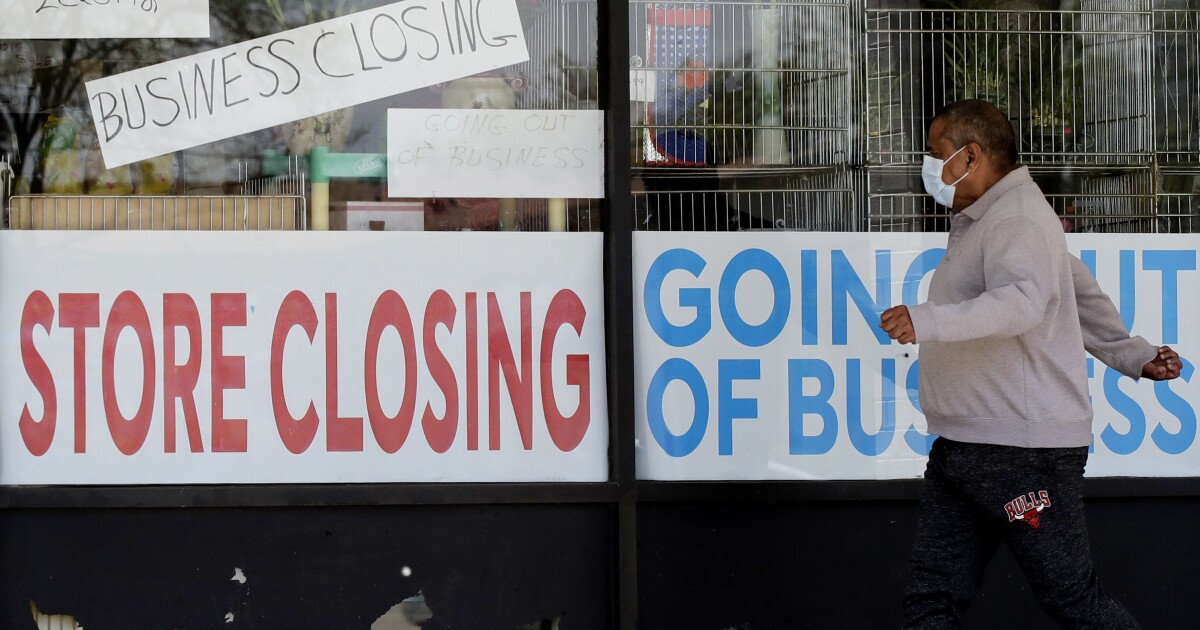

The United States economy will likely fall into a recession over the next year, according to a new survey of four dozen of the country’s leading business economists.
The survey, which was conducted by the National Association for Business Economics early this month and released Monday, found that 58% of participants predict a recession coming in the next 12 months. Still, the survey showed a lot of disagreement among economists, with some asserting a recession is all but certain and others saying the odds of a downturn are very low.
ECONOMY GREW BY 2.7% IN FOURTH QUARTER OF 2022, HOLDING UP DESPITE RISING INTEREST RATES
The recession fears come even as there were some signs of hope in January that the economy might side-step a recession. A few inflation reports released that month showed meaningful declines, and other data showed that the labor market is holding up remarkably well. But inflation reports released this month have been worse than expected, spooking markets.
There were also big differences among participants in forecasting other economic conditions, such as gross domestic product growth, unemployment, and what the Federal Reserve will end up doing with its monetary policy.
“Results of the February 2023 NABE Outlook survey continue to reflect significant divergence regarding the outlook for the U.S. economy,” said NABE President Julia Coronado. “Estimates of inflation-adjusted gross domestic product or real GDP, inflation, labor market indicators, and interest rates are all widely diffused, likely reflecting a variety of opinions on the fate of the economy—ranging from recession to soft landing to robust growth.”
On average, economists expect GDP growth to be largely stagnant this year as the economy struggles under the weight of rising interest rates. The median projection for real GDP growth is 0.3% from the fourth quarter of 2022 to the fourth quarter of 2023. They then expect GDP growth to pick back up in 2024 and average about 1.9% next year.
Still, there was much variation in GDP forecasts. The estimates between the lowest five responses and the highest five responses for this year range from -1.3% to 1.9% in 2023.
The economists were also asked about the surprisingly robust labor market, which has seemingly defied the gravitational pull of rising rates. In fact, the unemployment rate ticked down to the lowest rate since 1969 in January and is now clocking in at 3.4%.
The economists expect the unemployment rate to tick up to 4.4% by the first quarter of 2024 and then to average 4.3% in 2024 as a whole. Still, some of the economists surveyed expect the unemployment rate to trend up to as much as 5.7% this year as the labor market finally feels the shock of high-interest rates.
In terms of how high the Fed will move interest rates, the median forecast among the business economists for the overnight lending rate at the end of this year is 4.875%, an increase from the 4.625% predicted when this survey was last conducted in December.
“Panelists’ views are split regarding how high the Federal Reserve may raise interest rates, how long rates might stay at the peak, when cuts would begin, and what would signal the central bank’s actions on each of these fronts,” said Dana Peterson, NABE Outlook Survey chairwoman.
The debt ceiling is also an issue that has gotten attention this year and will inevitably because one of the biggest economic stories of the year as the U.S. approaches the so-called “X-date,” when the government could default on its obligations.
The U.S. hit its debt ceiling last month, and the Treasury Department began “extraordinary measures” to prevent default. The measures essentially amount to shifting money around government accounts in order to pay incoming bills without issuing new debt.
But the U.S. will soon deplete those extraordinary measures and run out of ways to prevent the government from defaulting sometime this summer, between July and September, the Congressional Budget Office is now projecting. Republicans are hoping to use the looming date to extract concessions from the Biden administration. They hope to see spending cuts in light of soaring inflation and high deficits.
CLICK HERE TO READ MORE FROM THE WASHINGTON EXAMINER
The business economists, though, don’t think the U.S. is likely to default. The overwhelming majority predict that the game of chicken will be resolved, with 71% expecting Congress to raise it in time and 26% guessing the debt ceiling will be suspended. A mere 2% think that the limit will be breached.
But, if the worst happens and the U.S. does exceed its debt limit, just over half of respondents predict that it will lead to a global financial crisis if the gridlock lasts for several months. A small group, 27%, predict an immediate global financial crisis if the ceiling is exceeded, and about a quarter don’t think there will be a financial crisis if the U.S. defaults.







